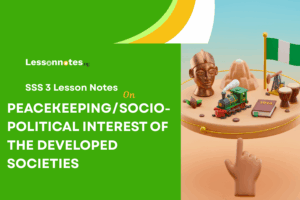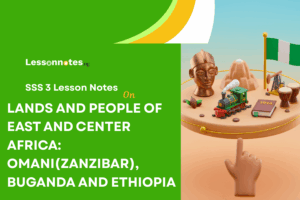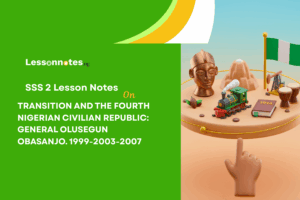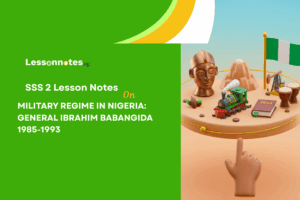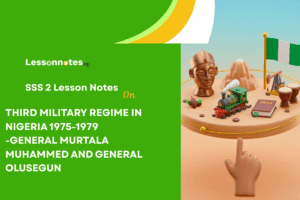4th Military Regime In Nigeria: Major General Muhammed Buhari & Brigadier Tunde Idiagbon 1983-1985 SS2 Nigerian History Lesson Note
Download Lesson NoteTopic: 4th Military Regime In Nigeria: Major General Muhammed Buhari & Brigadier Tunde Idiagbon 1983-1985
On December 31, 1983, Nigeria’s Second Republic came to an end when the military took over the government. The coup was led by Major General Muhammadu Buhari, who became the new Head of State. Brigadier Tunde Idiagbon was appointed as Chief of Staff, Supreme Headquarters, making him the second-in-command. Together, they ruled Nigeria for 20 months until August 1985.
Reasons for the Military Takeover
The Buhari-led military gave several reasons for overthrowing the civilian government of President Shehu Shagari:
- Widespread Corruption: They claimed that politicians were stealing public money and getting rich while ordinary Nigerians suffered.
- Economic Crisis: Nigeria was facing serious economic problems. Oil prices had fallen, and the country had little money left. There were shortages of food and other basic items.
- Rigged Elections: The 1983 elections were widely believed to be dishonest, with many cases of cheating and violence.
- Poor Leadership: The military claimed that the civilian leaders were not serious about solving Nigeria’s problems.
- Indiscipline: There was a general breakdown of law and order, with people not following rules and regulations.
Structure of the Government
Buhari set up the Supreme Military Council (SMC) as the highest decision-making body. The government also included:
- The Federal Executive Council (made up of military officers and some civilians)
- Military Governors for each state
- Military tribunals (special courts) to try cases of corruption and political crimes
The constitution was suspended, and the military ruled by decree (direct orders that became law).
War Against Indiscipline (WAI)
One of the most famous programs of the Buhari regime was the War Against Indiscipline. This campaign aimed to make Nigerians more orderly, patriotic, and law-abiding. WAI had several phases:
- Queue Culture: Teaching Nigerians to stand in line (queue) at bus stops, banks, and other public places instead of pushing and shoving.
- Work Ethics: Encouraging people to be on time for work and to work hard while at their jobs.
- Patriotism and Nationalism: Promoting love for Nigeria through the national anthem, flag, and other symbols.
- Anti-Corruption: Fighting against bribery and dishonesty in public service.
- Environmental Sanitation: Making people clean their surroundings. Every last Saturday of the month was declared Environmental Sanitation Day, when everyone had to clean their homes and communities.
The WAI campaign was enforced by soldiers and police. People who did not follow the rules could be punished by being made to do “frog jumps” (a physical exercise) or even being whipped in public.
Economic Policies
The Buhari government faced a serious economic situation and took strict measures to address it:
- Import Restrictions: Many foreign goods were banned to save Nigeria’s foreign currency and encourage local production.
- Austerity Measures: Government spending was cut, and many projects were stopped.
- Counter-Trade: Instead of using money, Nigeria started exchanging oil for goods with other countries.
- Debt Repayment: The government insisted on paying Nigeria’s foreign debts despite the economic hardship.
- Currency Change: Old Naira notes were changed for new ones to control money supply and catch people with illegal money.
- Price Control: The government set prices for basic goods to prevent them from becoming too expensive.
These policies caused hardship for many Nigerians, as there were shortages of goods, and many businesses closed down.
Fight Against Corruption
The Buhari regime was known for its strong stand against corruption:
- Recovery of Public Funds: The government tried to get back money stolen by politicians.
- Public Officers Investigation: A special team checked the wealth of former government officials.
- Special Military Tribunals: Special courts were set up to try corrupt officials quickly.
- Jail Terms: Many former politicians were sent to jail for corruption. Some got sentences of over 100 years.
- Decree 4: A law that made it illegal for journalists to publish anything that could embarrass government officials, even if it was true.
The anti-corruption drive was popular with many Nigerians who were angry about the way politicians had misused public funds. However, some people thought the military was too harsh and was targeting political enemies.
Human Rights Issues
The Buhari regime was criticized for its poor human rights record:
- Detention Without Trial: Many politicians and critics were put in jail without going to court.
- Press Censorship: Newspapers were not allowed to criticize the government freely. Two journalists, Tunde Thompson and Nduka Irabor, were jailed under Decree 4.
- Retroactive Laws: Some laws were made to punish actions that happened before the laws were created. For example, drug traffickers were executed for crimes committed before the death penalty was introduced for drug trafficking.
- Public Executions: Some criminals, especially drug dealers, were executed by firing squad in public.
- Harsh Punishments: People were given very long jail terms, sometimes over 100 years, which they could never complete in their lifetime.
These actions made many Nigerians and international organizations criticize the government for being too strict and not respecting human rights.
Foreign Policy
In international relations, the Buhari government:
- Maintained Neutrality: Stayed friendly with both Western and Eastern bloc countries during the Cold War.
- Focused on Africa: Put African issues at the center of Nigeria’s foreign policy.
- Border Closure: Kept Nigeria’s borders closed to control smuggling.
- ECOWAS Relations: Tried to improve relationships with neighboring countries after the tensions caused by the expulsion of illegal immigrants in 1983.
- Anti-Apartheid Stance: Continued Nigeria’s strong opposition to the racist government in South Africa.
Major Challenges
The Buhari-Idiagbon regime faced several challenges:
- Economic Difficulties: The decline in oil prices made it hard to get foreign currency needed for imports.
- Shortages: There were shortages of essential goods like food, medicines, and spare parts.
- Public Resistance: Some Nigerians resisted the strict measures, especially the War Against Indiscipline.
- International Criticism: Foreign countries and organizations criticized the human rights abuses.
- Religious Tensions: There were concerns about religious balance in government appointments.
The End of the Regime
On August 27, 1985, while General Buhari was in Mecca for the Hajj (Muslim pilgrimage) and Brigadier Idiagbon was also out of the country, another military officer, Major General Ibrahim Babangida, led a bloodless coup to overthrow the government. The coup plotters called it a “palace coup” because it involved mostly military officers who were already in the government.
Reasons given for the coup included:
- The harsh and inflexible leadership style of Buhari and Idiagbon
- The economic hardship caused by their policies
- Human rights abuses and restrictions on freedom
- Refusal to set a timetable for return to civilian rule
- Sidelining of some military officers from decision-making
Buhari was detained for three years after the coup, while Idiagbon retired to his hometown.
Achievements of the Buhari-Idiagbon Regime
- Improved Discipline: The WAI campaign brought more order to public life.
- Reduced Corruption: The strong measures against corruption made many public officials more careful.
- Patriotism: The regime encouraged national pride and respect for Nigerian symbols.
- Clean Environment: Environmental sanitation improved in many parts of the country.
- Reduced Crime: Strict law enforcement led to a decrease in crime rates.
- Financial Prudence: Government spending was controlled better than during the civilian era.
Criticisms and Failures
- Human Rights Abuses: The regime was criticized for detaining people without trial and restricting free speech.
- Economic Hardship: The strict economic policies caused suffering for many Nigerians.
- Lack of Democratic Roadmap: The regime did not provide a clear plan for returning to civilian rule.
- Harsh Punishments: Some punishments were seen as too severe for the crimes committed.
- Media Repression: The restrictions on press freedom were widely condemned.
Legacy
The Buhari-Idiagbon regime, though short-lived, left a lasting impact on Nigeria:
- It showed that the military could take strong action against corruption and indiscipline.
- It introduced the culture of environmental sanitation that continues in many parts of Nigeria today.
- It showed the negative effects of using too much force to solve national problems.
- It highlighted the importance of balancing strict measures with respect for human rights.
- Interestingly, Muhammadu Buhari would return as Nigeria’s democratically elected president in 2015, 30 years after being removed from power.
The 20-month rule of Buhari and Idiagbon is often remembered for its strictness and discipline. While some Nigerians look back on this period with nostalgia, especially for its anti-corruption stance, others remember it as a time of hardship and fear. The regime showed both the potential benefits and dangers of strong military leadership in addressing national problems.



